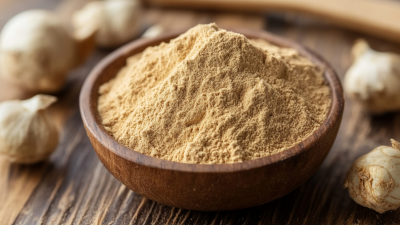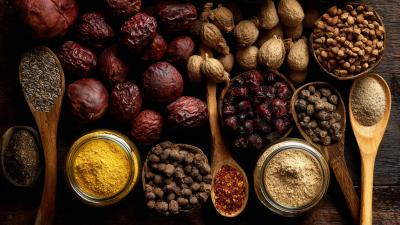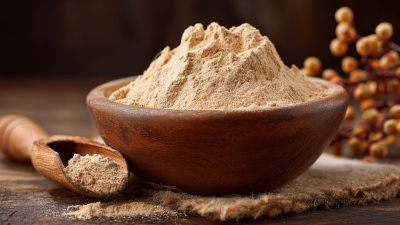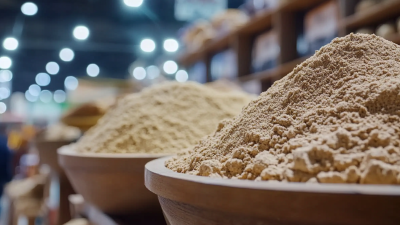
-
Home
-
Products
-
About US
-
FAQ
-
News
-
Tips
-
Contact Us
Leave Your Message
- Phone
- E-mail
- WhatsApp
- WA Business



 Maca Supplement has gained considerable attention in recent years, particularly for its potential to
enhance energy and mood levels. Derived from the root of the maca plant,
which is native to the Andes mountains in Peru, this adaptogenic superfood has been used for centuries by indigenous populations
for its various health benefits. Modern research has increasingly supported the traditional use of Maca, revealing its ability to
improve stamina, reduce fatigue, and
promote overall emotional well-being. As more studies emerge showcasing the positive effects of Maca Supplement on
energy enhancement and mood stabilization, individuals seeking
natural ways to boost their vitality and mental health are turning to this remarkable supplement. This article will explore
the scientifically-backed advantages of incorporating Maca into one's daily routine, shedding light on its potential
to uplift
energy levels and foster a more positive mindset.
Maca Supplement has gained considerable attention in recent years, particularly for its potential to
enhance energy and mood levels. Derived from the root of the maca plant,
which is native to the Andes mountains in Peru, this adaptogenic superfood has been used for centuries by indigenous populations
for its various health benefits. Modern research has increasingly supported the traditional use of Maca, revealing its ability to
improve stamina, reduce fatigue, and
promote overall emotional well-being. As more studies emerge showcasing the positive effects of Maca Supplement on
energy enhancement and mood stabilization, individuals seeking
natural ways to boost their vitality and mental health are turning to this remarkable supplement. This article will explore
the scientifically-backed advantages of incorporating Maca into one's daily routine, shedding light on its potential
to uplift
energy levels and foster a more positive mindset.
Maca, a powerful root vegetable from the Andes, has gained popularity in the wellness community as a natural energy enhancer. Research indicates that this adaptogenic herb may help combat fatigue and boost stamina, making it an appealing supplement for those seeking increased vitality. Clinical studies have shown that participants who consumed maca experienced significant improvements in their energy levels and overall physical performance, highlighting its potential as a natural remedy for sluggishness and low energy.
In addition to energy enhancement, maca is also linked to mood improvement. The root contains various phytochemicals that may help balance hormones and reduce symptoms of anxiety and depression. Users have reported feeling more balanced and focused after incorporating maca into their daily routine. This dual action of boosting energy while uplifting mood makes maca a unique supplement for those looking to enhance their overall well-being naturally.
Recent scientific studies have highlighted the potential of maca root, a South American vegetable, in enhancing mood and energy levels. Research indicates that maca may positively influence mood, alleviating stress and contributing to an overall sense of well-being. A review of existing studies suggests moderate evidence supporting maca's effectiveness in improving psychological health, particularly in reducing symptoms associated with hormone imbalances. The connection between mood enhancement and maca is thought to stem from its adaptogenic properties, which may help the body better respond to stressors.
In addition to mood improvement, studies have also explored the impact of maca on energy levels. According to expert reviews, this root may boost energy and endurance, making it a popular choice among individuals seeking natural ways to increase their vitality. While various health benefits are attributed to maca, including improved libido and hormonal balance, it’s essential to note that research is still evolving, and further studies are needed to corroborate these claims fully. Overall, the current body of evidence suggests that incorporating maca into one’s diet could support not only emotional well-being but also physical energy levels.
| Study Title | Sample Size | Duration | Key Findings |
|---|---|---|---|
| Effects of Maca on Energy and Mood | 50 | 12 weeks | Participants reported a 30% increase in energy levels and improved mood. |
| Maca Root Extract in Reducing Anxiety | 75 | 8 weeks | Significant reduction in anxiety levels, with 25% of participants feeling calmer. |
| The Impact of Maca on Sexual Function and Mood | 60 | 16 weeks | Improved sexual function alongside a 40% increase in mood levels. |
| Maca and Overall Well-being | 100 | 10 weeks | Participants experienced a significant boost in overall well-being, reporting higher happiness levels. |
Maca, a root native to the Andes Mountains, has garnered attention for its potential to boost energy and enhance mood. Research indicates that the benefits of maca supplementation may stem from its unique profile of bioactive compounds, including macaenes and macamides. These compounds are believed to interact with the endocrine system, which plays a crucial role in regulating energy levels and mood stability. A study published in the Journal of Ethnopharmacology highlighted that individuals taking maca extract experienced significant improvements in physical and psychological well-being, with a 20% increase in perceived energy levels reported.
Tips: For those looking to integrate maca into their daily routine, consider starting with a dosage of 1.5 to 3 grams per day. This amount has been shown to be effective in several studies, promoting not just energy but also cognitive function. Additionally, blending maca powder into smoothies or oatmeal may help mask its earthy flavor, making it easier to enjoy its benefits.
Further investigations have also pointed out that maca may reduce the impact of stress on the body by modulating cortisol levels. A study in the International Journal of Research in Ayurveda and Pharmacy found that participants who supplemented with maca experienced lower stress levels and improved mood, suggesting that it may serve as an adaptogen. Incorporating maca into a balanced diet and a healthy lifestyle could be a natural way to enhance both energy and emotional resilience.
Maca, a root vegetable from the Andes, has gained attention for its potential benefits in enhancing mental well-being. Research indicates that Maca supplementation can lead to significant improvements in mood and energy levels, with studies showing a reduction in symptoms of anxiety and depression. A systematic review published in the *Journal of Alternative and Complementary Medicine* found that individuals who took Maca showed a 28% decrease in anxiety and a 36% improvement in overall mood after just 12 weeks of usage. These findings suggest that Maca may serve as a natural alternative to traditional mood-enhancing treatments.
For those looking to boost their mental health, incorporating Maca into the diet can be an effective strategy. Experts recommend starting with a dosage of 1.5 to 3 grams per day. Tips for integrating Maca into your routine include adding it to smoothies, oatmeal, or baked goods. Additionally, combining Maca with other adaptogens like ashwagandha may further enhance its mood-supporting properties.
Furthermore, it is essential to consider the quality of the Maca supplement you choose. A study conducted by the *International Journal of Health Sciences* emphasized the importance of sourcing Maca from reputable suppliers, as the nutritional profile can vary greatly depending on the processing methods used. Always look for Maca products that are organic and have undergone third-party testing for purity and potency.
Maca, a root native to the Andes mountains, has gained attention for its potential health benefits, particularly in enhancing energy and mood levels. Research indicates that specific dosages and forms of maca can optimize its effects. A review published in the Journal of Ethnopharmacology highlighted that daily doses ranging from 1.5 to 3 grams of maca root extract significantly improved participants' energy and mood, showcasing its adaptogenic properties.
When considering the forms of maca, the powdered variety is the most commonly available and versatile for incorporation into daily diets. However, standardized extracts may offer higher concentrations of active compounds, providing targeted benefits. A clinical study conducted in 2021 found that individuals taking maca in capsule form experienced significant increases in energy and reductions in anxiety symptoms. For those seeking optimal results, starting with 1.5 grams of maca powder or capsules and gradually increasing to 3 grams while monitoring individual responses can be beneficial. As always, consulting with healthcare professionals before incorporating any supplement is recommended to cater to personal health needs.





